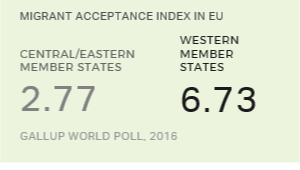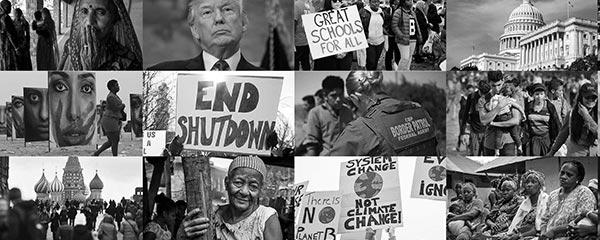Story Highlights
- Migrant acceptance lower among Trump supporters
- Migrant acceptance higher among Trudeau supporters
- Religious Americans less accepting of migrants
WASHINGTON, D.C. -- Canada and the U.S. are both among the top 10 most-accepting countries in the world for migrants, but Canadians are somewhat more open to migrants than their American neighbors. Canada scores an 8.14 (out of a possible 9.0) on ║┌┴¤═°'s Migrant Acceptance Index (MAI), ranking it fourth out of 140 countries, while the U.S. is in ninth place, with a score of 7.86.
| Migrant Acceptance Index | |||||||||||||||||||||||||||||||||||||||||||||||||||||||||||||||||||||||||||||||||||||||||||||||||||
|---|---|---|---|---|---|---|---|---|---|---|---|---|---|---|---|---|---|---|---|---|---|---|---|---|---|---|---|---|---|---|---|---|---|---|---|---|---|---|---|---|---|---|---|---|---|---|---|---|---|---|---|---|---|---|---|---|---|---|---|---|---|---|---|---|---|---|---|---|---|---|---|---|---|---|---|---|---|---|---|---|---|---|---|---|---|---|---|---|---|---|---|---|---|---|---|---|---|---|---|
| Iceland | 8.26 | ||||||||||||||||||||||||||||||||||||||||||||||||||||||||||||||||||||||||||||||||||||||||||||||||||
| New Zealand | 8.25 | ||||||||||||||||||||||||||||||||||||||||||||||||||||||||||||||||||||||||||||||||||||||||||||||||||
| Rwanda | 8.16 | ||||||||||||||||||||||||||||||||||||||||||||||||||||||||||||||||||||||||||||||||||||||||||||||||||
| Canada | 8.14 | ||||||||||||||||||||||||||||||||||||||||||||||||||||||||||||||||||||||||||||||||||||||||||||||||||
| Sierra Leone | 8.05 | ||||||||||||||||||||||||||||||||||||||||||||||||||||||||||||||||||||||||||||||||||||||||||||||||||
| Mali | 8.03 | ||||||||||||||||||||||||||||||||||||||||||||||||||||||||||||||||||||||||||||||||||||||||||||||||||
| Australia | 7.98 | ||||||||||||||||||||||||||||||||||||||||||||||||||||||||||||||||||||||||||||||||||||||||||||||||||
| Sweden | 7.92 | ||||||||||||||||||||||||||||||||||||||||||||||||||||||||||||||||||||||||||||||||||||||||||||||||||
| United States | 7.86 | ||||||||||||||||||||||||||||||||||||||||||||||||||||||||||||||||||||||||||||||||||||||||||||||||||
| Nigeria | 7.76 | ||||||||||||||||||||||||||||||||||||||||||||||||||||||||||||||||||||||||||||||||||||||||||||||||||
| ║┌┴¤═° World Poll, 2016-2017 | |||||||||||||||||||||||||||||||||||||||||||||||||||||||||||||||||||||||||||||||||||||||||||||||||||
║┌┴¤═° created the Migrant Acceptance Index to gauge people's acceptance of migrants based on increasing degrees of personal proximity. The index is based on three questions ║┌┴¤═° asked in 138 countries in 2016 and in the U.S. and Canada in 2017. The questions ask whether people think migrants living in their country, becoming their neighbors and marrying into their families are good things or bad things. The higher the score, the more accepting the population is of migrants.
The bulk of the most-accepting countries for migrants come from regions all over the globe -- Oceania, Western Europe, sub-Saharan Africa and Northern America. However, a common thread tying many of the most-accepting countries together is their long reputation as receiving countries for migrants -- like the U.S. and Canada.
But the future of this reputation is currently in question in these two countries. At the same time that Canada's government under Prime Minister Justin Trudeau has been opening its doors wider to migrants and refugees, the U.S. government under President Donald Trump has been trying to shut its doors.
Migrant acceptance in both countries largely follows these political fault lines. In the U.S., those who approve of Trump's job performance score a 7.08 out of a possible 9.0 on the Migrant Acceptance Index, while those who disapprove score nearly 1.5 points higher -- 8.54. In Canada, those who approve of Trudeau's job performance score an 8.64, while the score is 7.84 among those who disapprove.
| Migrant Acceptance Index | ||||||||||||||||||||||||||||||||||||||||||||||||||||||||||||||||||||||||||||||||||||||||||||||||||||
|---|---|---|---|---|---|---|---|---|---|---|---|---|---|---|---|---|---|---|---|---|---|---|---|---|---|---|---|---|---|---|---|---|---|---|---|---|---|---|---|---|---|---|---|---|---|---|---|---|---|---|---|---|---|---|---|---|---|---|---|---|---|---|---|---|---|---|---|---|---|---|---|---|---|---|---|---|---|---|---|---|---|---|---|---|---|---|---|---|---|---|---|---|---|---|---|---|---|---|---|---|
| Americans | ||||||||||||||||||||||||||||||||||||||||||||||||||||||||||||||||||||||||||||||||||||||||||||||||||||
| Approve of Trump | 7.08 | |||||||||||||||||||||||||||||||||||||||||||||||||||||||||||||||||||||||||||||||||||||||||||||||||||
| Disapprove of Trump | 8.54 | |||||||||||||||||||||||||||||||||||||||||||||||||||||||||||||||||||||||||||||||||||||||||||||||||||
| Confident in national government | 7.57 | |||||||||||||||||||||||||||||||||||||||||||||||||||||||||||||||||||||||||||||||||||||||||||||||||||
| Not confident in national government | 8.09 | |||||||||||||||||||||||||||||||||||||||||||||||||||||||||||||||||||||||||||||||||||||||||||||||||||
| Approve of country's leadership | 7.32 | |||||||||||||||||||||||||||||||||||||||||||||||||||||||||||||||||||||||||||||||||||||||||||||||||||
| Disapprove of country's leadership | 8.36 | |||||||||||||||||||||||||||||||||||||||||||||||||||||||||||||||||||||||||||||||||||||||||||||||||||
| Canadians | ||||||||||||||||||||||||||||||||||||||||||||||||||||||||||||||||||||||||||||||||||||||||||||||||||||
| Approve of Trudeau | 8.64 | |||||||||||||||||||||||||||||||||||||||||||||||||||||||||||||||||||||||||||||||||||||||||||||||||||
| Disapprove of Trudeau | 7.84 | |||||||||||||||||||||||||||||||||||||||||||||||||||||||||||||||||||||||||||||||||||||||||||||||||||
| Confident in national government | 8.51 | |||||||||||||||||||||||||||||||||||||||||||||||||||||||||||||||||||||||||||||||||||||||||||||||||||
| Not confident in national government | 7.46 | |||||||||||||||||||||||||||||||||||||||||||||||||||||||||||||||||||||||||||||||||||||||||||||||||||
| Approve of country's leadership | 8.65 | |||||||||||||||||||||||||||||||||||||||||||||||||||||||||||||||||||||||||||||||||||||||||||||||||||
| Disapprove of country's leadership | 7.76 | |||||||||||||||||||||||||||||||||||||||||||||||||||||||||||||||||||||||||||||||||||||||||||||||||||
| ║┌┴¤═° World Poll, 2017 | ||||||||||||||||||||||||||||||||||||||||||||||||||||||||||||||||||||||||||||||||||||||||||||||||||||
The same relationships persist, although not to the same degree, when one looks at confidence in the national government and approval of the country's leadership in general. However, in the U.S., those who approve of Trump have far lower index scores than those who are confident in the national government and those who approve of the country's leadership more generally. The same pattern is not present in Canada, where MAI scores are similarly high for the country's leadership and Trudeau supporters.
Religious People in Each Country Are Less Accepting
While the World Poll does not ask people about their political leanings, religion and political identification are often intertwined, but particularly so in the United States. Americans who are highly religious are more likely to identify as Republicans -- the party of the president -- and as conservatives. In the more secular Canada, similar to the pattern in the U.S., more-religious Canadians tend to affiliate with the Conservative Party more than Trudeau's Labor Party.
Consistent with this relationship, in both the U.S. and Canada, people who say religion is an important part of their daily lives are less accepting of migrants than are people for whom religion is not that important.
| Migrant Acceptance Index | ||||||||||||||||||||||||||||||||||||||||||||||||||||||||||||||||||||||||||||||||||||||||||||||||||||
|---|---|---|---|---|---|---|---|---|---|---|---|---|---|---|---|---|---|---|---|---|---|---|---|---|---|---|---|---|---|---|---|---|---|---|---|---|---|---|---|---|---|---|---|---|---|---|---|---|---|---|---|---|---|---|---|---|---|---|---|---|---|---|---|---|---|---|---|---|---|---|---|---|---|---|---|---|---|---|---|---|---|---|---|---|---|---|---|---|---|---|---|---|---|---|---|---|---|---|---|---|
| Americans | ||||||||||||||||||||||||||||||||||||||||||||||||||||||||||||||||||||||||||||||||||||||||||||||||||||
| Religion important in daily life | 7.81 | |||||||||||||||||||||||||||||||||||||||||||||||||||||||||||||||||||||||||||||||||||||||||||||||||||
| Religion not important in daily life | 8.27 | |||||||||||||||||||||||||||||||||||||||||||||||||||||||||||||||||||||||||||||||||||||||||||||||||||
| Canadians | ||||||||||||||||||||||||||||||||||||||||||||||||||||||||||||||||||||||||||||||||||||||||||||||||||||
| Religion important in daily life | 8.00 | |||||||||||||||||||||||||||||||||||||||||||||||||||||||||||||||||||||||||||||||||||||||||||||||||||
| Religion not important in daily life | 8.49 | |||||||||||||||||||||||||||||||||||||||||||||||||||||||||||||||||||||||||||||||||||||||||||||||||||
| ║┌┴¤═° World Poll, 2017 | ||||||||||||||||||||||||||||||||||||||||||||||||||||||||||||||||||||||||||||||||||||||||||||||||||||
In the U.S., people who say religion is not an important part of their daily lives and who say they are not confident in the national government are the most accepting of migrants (8.46), while the index score is 7.28 for those who say religion is an important part of their daily lives and are confident in the national government. The pattern is the same in Canada.
The divide in migrant acceptance grows even larger among those who approve of Trump and are religious. The index score for Americans who approve of Trump and say religion is important in their daily lives is 6.97, while those who are not religious and do not approve of Trump score an 8.61.
Youngest, Most Educated in Each Country Are Most Accepting
For the most part, people's acceptance of migrants follows the same patterns in both Canada and the U.S.: Acceptance is higher among the youngest residents, those with the most education and those living in urban areas. And migrants themselves who live in either of these countries are more accepting than the native-born.
Although previous ║┌┴¤═° research shows that few Canadians or Americans think migrants take jobs that citizens want, residents with fewer economic advantages in each country are less likely to be accepting of migrants. In both countries, those who are in the workforce are more accepting than those out of the workforce, and those who are satisfied with their living standards and income are more accepting than those who are not.
Implications
Both Canada and the U.S. have long histories as receiving countries, but in the past two years, one government has embraced that history, while the other has been trying to distance itself from it. But even if Canadians are more accepting than Americans are of migrants, it's important to remember that the residents of both countries are still among the most accepting of migrants in the world.
Given that ║┌┴¤═° collected the U.S. and Canadian data on migrant acceptance in 2017, it's difficult to say how much the recent changes in migrant and refugee policies may have affected each country's MAI scores -- if at all. However, with the important role that migration will continue to play in shaping each country's future, the recent changes in policy are unlikely to be the last.
Survey Methods
These results are based on telephone and face-to-face interviews with approximately 1,000 adults, aged 15 and older, conducted throughout 2016 in 138 countries and in 2017 in the U.S. and Canada. In some countries, such as India, Russia and China, sample sizes are much larger, between 2,000 and 4,000 adults. Results for U.S. and Canada are based on surveys with 2,000 adults in each country. For results based on the total sample of national adults, the margin of sampling error ranges from ┬▒2.1 percentage points to ┬▒5.6 percentage points at the 95% confidence level. All reported margins of sampling error include computed design effects for weighting.
Learn more about how the works.
For more complete methodology and specific survey dates, please review .





